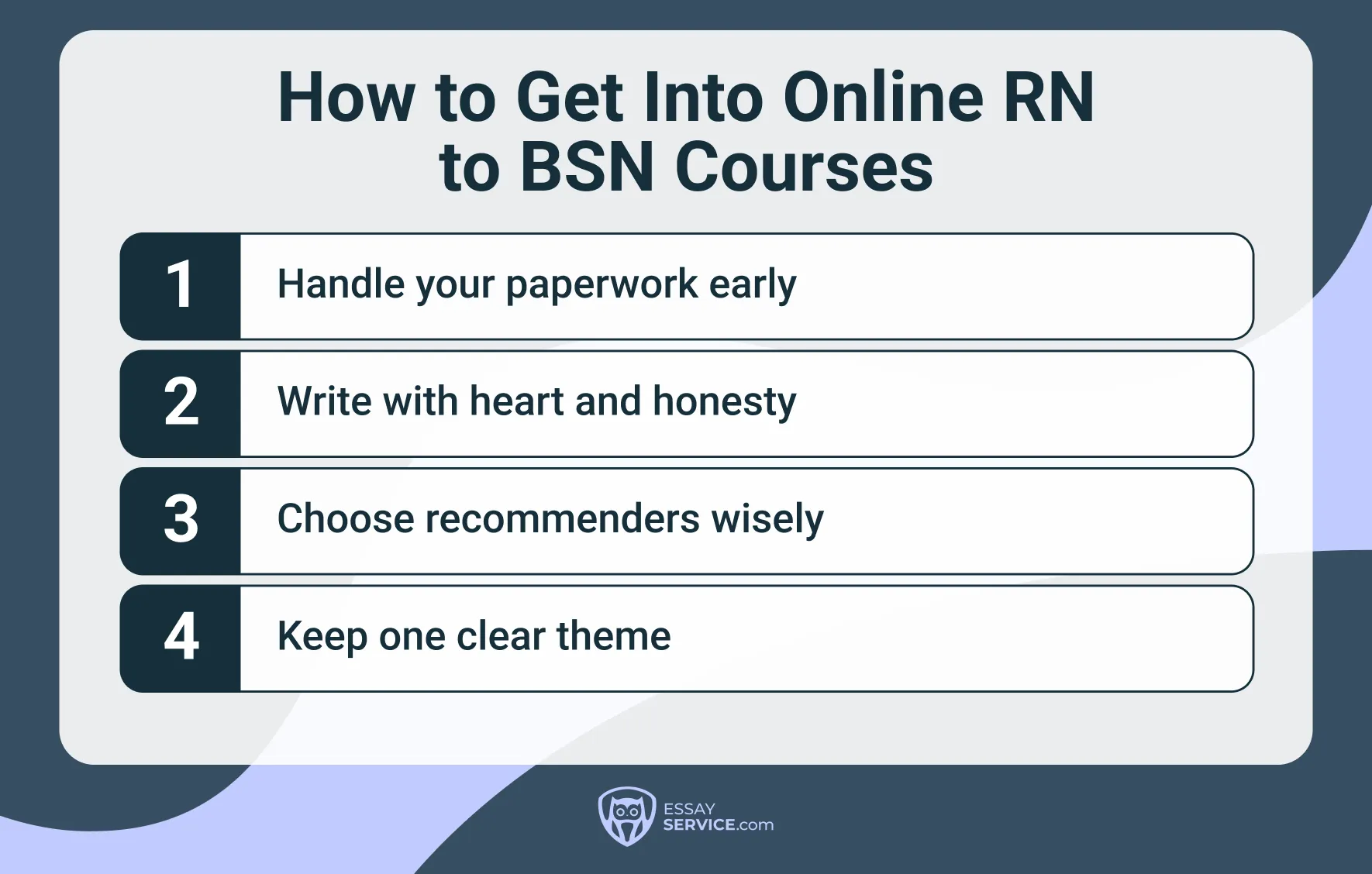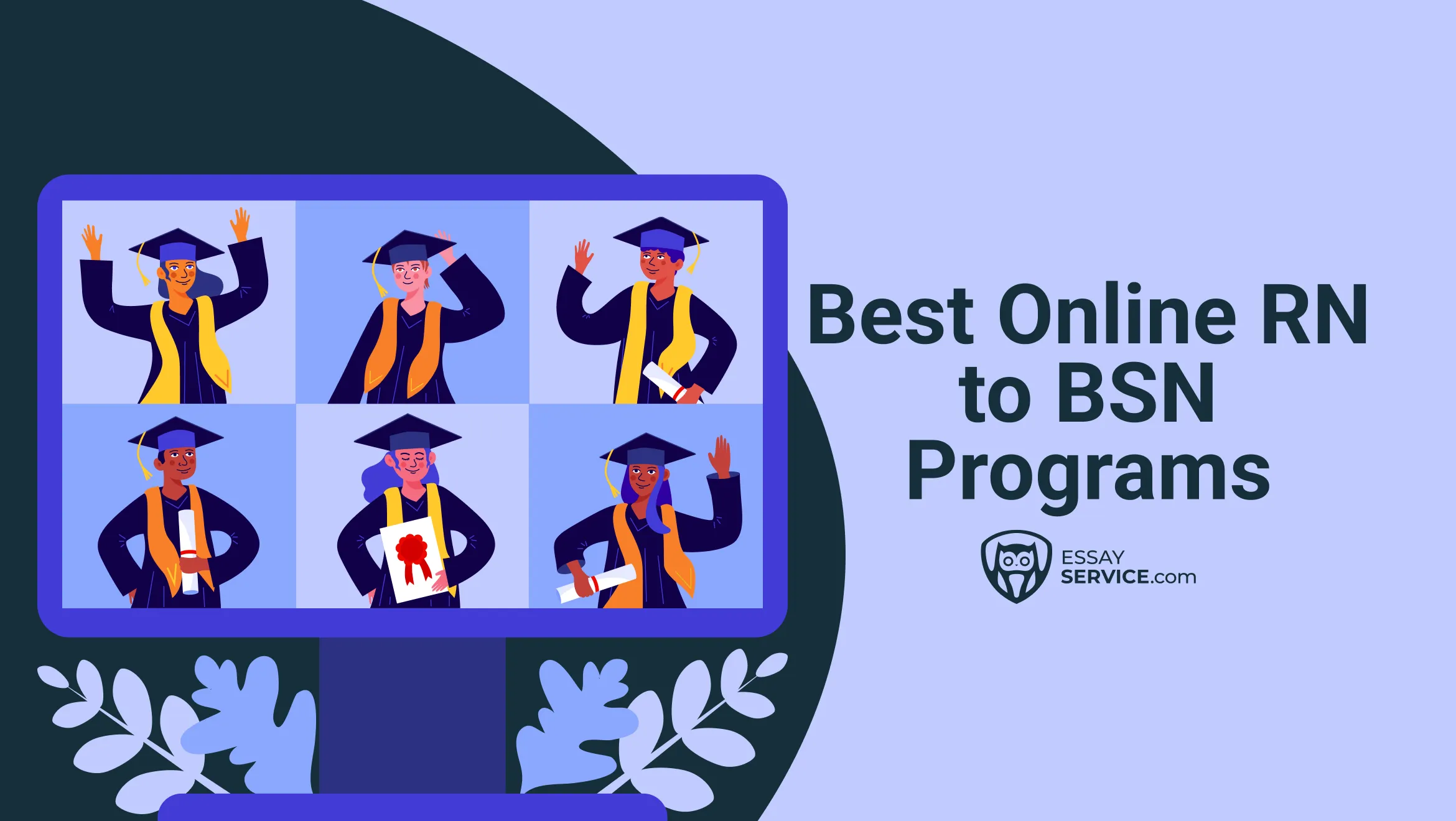If you’re already a nurse, getting your BSN is the next natural step. The BSN will make patient care more comfortable, provide access to better roles, and add to the foundation skills you use every day. The good thing is that most RN to BSN programs are fully online, so you can continue doing your job while working towards a degree.
Here are five programs that stand out right now:
- University of Texas at Arlington (UTA) - Registered Nurse to Bachelor of Science in Nursing Online
- Capella University - Online Bachelor of Science in Nursing,
- University of Central Florida - Nursing RN (BSN)
- Arizona State University - Online Bachelor of Science in Nursing: RN to BSN
- University of Illinois Chicago (UIC) - Online Registered Nurse to Bachelor of Science in Nursing
In this article, we’ll talk about the top online RN to BSN programs and explain what sets them apart, including tuition, accreditation, and approximate completion dates.
And as you’re working on your BSN, EssayService can give you a helping hand with your assignments, making sure your work is presented professionally.

What Matters When Choosing an Online RN to BSN Program
With your experience in healthcare, you know there’s no room for guesswork. This profession depends on planning, assessing, adapting, and precision. Choosing your RN to BSN program should feel just as deliberate. Here are five factors to consider when choosing the program:
- Accreditation: Choose programs accredited by CCNE or ACEN. That’s your guarantee the degree carries weight with hospitals and future employers.
- Credit transfer: Look for the schools that accept many, if not all, credits from your associate degree.
- Flexible schedules: The right program will offer short classes and flexible pacing and won’t ask you to give up shifts or family time.
- Realistic costs: Look for transparent pricing and schools that offer payment plans or employer partnerships.
- Real support: Online doesn’t mean alone. The best programs have professors who respond, advisors who guide, and classmates who keep you going when things get heavy.
The Best Accredited RN to BSN Online Programs
In the following section, you’ll find the best accredited online RN to BSN programs and get to know schools that understand how nurses live, work, and learn.
.webp)
University of Texas at Arlington (UTA)
Accreditation: CCNE
Total Credit Hours: 35
Estimated Tuition: ~$8,995 total
UTA is part of the College of Nursing and Health Innovation, one of the largest in the country, and it shows in the design. The program is fully online, yes, but it doesn’t feel detached.
It’s structured around eight-week courses that let you focus hard on one subject at a time: nursing research one term, community health the next, then leadership or evidence-based practice. Nurses with an active license and an associate degree can bring in up to 30 credits, cutting the total down to 35 hours of upper-division work.

Capella University
Accreditation: CCNE
Total Credit Hours: 45
Estimated Tuition: $14,120 - $22,250
Capella’s RN to BSN program is accredited by the CCNE and offers two learning tracks: GuidedPath for those who prefer steady deadlines and FlexPath for those who want to move at their own speed.
Many nurses choose the FlexPath track because it lets them accelerate by demonstrating mastery of known content. Some finish in less than a year, while others move at a slower pace, negotiating coursework around shifts or family commitments.

University of Central Florida
Accreditation: CCNE
Total Credit Hours: 30
Estimated Tuition: ~US$5,400 for Florida residents, about ~US$23,000 for non-residents.
UCF’s RN to BSN degree is run through the College of Nursing, a nationally recognized school. Admission requires an active RN license and an associate degree, and the coursework adds up to about 30 credit hours at the upper-division level.
You start with foundational courses in professional nursing practice, then move into more advanced topics like population health, leadership, and evidence-based decision-making. The Community and Public Health Nursing course tends to stand out; it pushes students to design interventions that reflect real local needs rather than textbook cases.

Arizona State University
Accreditation: CCNE
Total Credit Hours: 36
Estimated Tuition: $19,944
ASU’s online track is offered in short modules (about 7.5 weeks). It accepts up to 64 transfer credits from your associate degree, which means you don’t have to repeat what you already know.
There are multiple start dates around the year, and many students finish in 14-24 months (depending on how many transfer credits you bring and how fast you take courses). Importantly, ASU’s diploma is identical to the on-campus BSN as there is no ‘online’ designation.
.webp)
University of Illinois Chicago (UIC)
Accreditation: CCNE
Total Credit Hours: 30
Estimated Tuition: ~$9,990 total ($330 per credit hour)
If you’re working as an RN and you want to earn your BSN without uprooting your life or going on campus, this program could fit. UIC’s curriculum focuses on evidence-based practice, health assessment, population health, nursing informatics, leadership and management, quality and safety.
Typical completion time can be as few as 12 months for full-time students. UIC’s online RN to BSN classes emphasize strong student-faculty interaction and personalized support, making it a good fit for RNs who value close connection even online.

Liberty University
Accreditation: CCNE
Total Credit Hours: 30
Estimated Tuition: ~$11,700 total
To enter Liberty’s online RN to BSN, students must transfer in at least 39 credit hours that count toward the BSN.
Courses cover advanced nursing communication, leadership in nursing, community health, population health, evidence-based practice, and a strong Christian ethical foundation. Admission requires a successful completion of prerequisites, including general education and the sciences part of the plan.

University of Phoenix
Accreditation: CCNE
Total Credit Hours: 40
Estimated Tuition: $14,000
The program offers two main pathways: a traditional online track and a competency-based track. The traditional path lets you complete one course at a time (each around five weeks) and finish in about 14 months if you transfer to an associate degree in nursing (ADN).
The competency-based track is self-paced, aimed at RNs with at least one year of clinical experience, and may allow completion in as little as 12 months. Curriculum highlights include leadership in nursing, health-information technology, quality improvement, and evidence-based practice.

Herzing University
Accreditation: CCNE
Total Credit Hours: 26
Estimated Tuition: $11,700
With Herzing’s RN to BSN program, you’ll build your nursing practice by studying leadership, quality improvement, nursing informatics, and community and population health. Just like most of the programs listed here, Herzing allows students to transfer in prior credits.
With the right amount of transfer credits, you can complete the program in 12 months. The program acknowledges you as someone who already works hard, so it emphasizes flexibility, offering multiple start dates, online access, and structured support.

Chamberlain University
Accreditation: CCNE
Total Credit Hours: 45
Estimated Tuition: $28,575
Chamberlain’s online program has no mandatory login times, letting you build your own schedule. The foundational credit structure includes up to 77 proficiency credits awarded for prior RN education, which leaves around 45 credit hours.
The program offers multiple eight-week start dates throughout the year, so you don’t have to wait long for the next cohort. The curriculum includes direct-care components (applied learning linked to your workplace) and interactive, online coursework structured around nursing leadership, community health, evidence-based practice, and informatics.
.webp)
University of Cincinnati
Accreditation: CCNE
Total Credit Hours: 27
Estimated Tuition: Resident: $21,978 Non-Resident: $22,518
The program at Cincinnati is built around nine core nursing courses, totaling 27 credit hours for the BSN component. The pace is adjustable, so students can finish in as little as two semesters (approximately eight months) or take up to five semesters (about 20 months) if balancing work and study.
The program features no additional clinical hours beyond what you may already carry as an RN, easy credit transfer from prior nursing education, multiple start dates throughout the year, and optional tracks such as Public Health Nursing or Nurse Educator.
.webp)
West Virginia University (WVU)
Accreditation: CCNE
Total Credit Hours: 30
Estimated Tuition: ~$600 per credit hour (Resident Online)
At WVU, you study only when it fits your schedule. Once the admission requirements are met, you can complete the program (30 credit hours) in as few as three semesters if you study full-time.
A key benefit of this program is that all students pay in-state tuition rates, regardless of residency. The curriculum includes professional nursing practice, leadership, community health, and quality improvement, out of which many are applied directly in your workplace, not just hypothetical cases.

University of Oklahoma
Accreditation: CCNE
Total Credit Hours: 30
Estimated Tuition: Resident: $6,558
Non-Resident: $18,322.50
The program is fully online through the Fran and Earl Ziegler College of Nursing. Flexible practicum options allow students to complete virtual simulation rather than traditional hospital hours. You have two enrollment options: a fast-track two-semester full-time path or a four-semester part-time path, which is relatively slower.
Graduates of the program are prepared to provide safe, competent, ethical care across the lifespan, work effectively on interdisciplinary teams, use health-care technology, and evaluate and improve nursing practice.

George Washington University
Accreditation: CCNE
Total Credit Hours: 36
Estimated Tuition: $15,670
You can enter GWU’s online RN to BSN program with up to 84 credits of advanced nursing, leaving about 21 credit hours of coursework (plus 15 credits via a professional portfolio, for a total of roughly 36 credit hours).
The curriculum focuses on leadership, health policy, evidence-based practice, patient safety and quality, and community health, aiming to expand your nursing experience into a broader impact.

Georgia State University
Accreditation: CCNE
Total Credit Hours: 30
Estimated Tuition: $10,000 - $12,000
At Georgia State’s online RN to BSN program, you’ll do almost everything online, except for two courses that include clinical rotations at approved partner organizations.
The curriculum spans 30 credit hours and is designed to be completed in three semesters of full-time study, but you can also take a part-time pathway with fewer than nine credit hours per semester. The main focus is on gaining skills that align with today’s healthcare demands, like nursing informatics, professional nursing practice, and evidence-based care.
.webp)
Western Governors University (WGU)
Accreditation: CCNE
Total Credit Hours: 24
Estimated Tuition: $5,525 - $44,200 (depends on completion speed)
What stands out about WGU is that rather than charging per credit, tuition is based on six-month terms, and you can complete as many courses as you’re able during that period, which means if you move quickly, you’ll pay less overall.
Transfer credit is generous, too: you may bring in up to 80-90 credits from previous work, which lightens your course load considerably. The curriculum includes about 23 courses tailored to the nursing field, and the clinical requirement is 24 hours, which is the lowest among many BSN programs.
How Online RN to BSN Programs Help You Earn Your Degree
Online RN to BSN degrees are built for nurses who already know what real work looks like: long shifts, quick thinking, and learning on the go. These programs help you turn all that into a bachelor’s without stepping away from the job.
You can take classes from anywhere and set your own learning pace, choosing when to attend lessons. Although mostly online, some programs include occasional in-person meetings or community projects to assess your skills.
Each course focuses on practical skills like leadership, public health, and clinical decision-making. You’ll recognize most of what you study, just through a deeper lens.
The setup works around your shifts and even unpredictable parts of nursing life. These programs give you a straight path from where you are to where you want to go next.
RN to BSN Requirements for Online Programs
By now, you already know that RN to BSN programs aren’t for beginners. They’re designed for registered nurses who want to take the next step in their education and career. But what exactly are the RN to BSN prerequisites for these online programs?
Most schools start with the basics:
- An active and unrestricted RN license
- Proof that you’ve passed the NCLEX
- An associate degree or nursing diploma from an accredited program.
From there, you’ll send transcripts so the school can see what carries over, because there’s no reason to repeat what you’ve already mastered. Many students bring in enough credits that they can seriously shorten the graduation timeline.
As for the GPA, most schools accept 2.5, but many aren’t strict about numbers because they know that sometimes skill and resilience can’t be measured on paper.
You’ll likely need to complete general education courses such as anatomy, microbiology, and English composition.
If you’re already licensed, already working, already carrying the mental checklist of a nurse everywhere you go, it’s safe to say that you qualify. These programs exist for people who simply need the degree to match the experience.
How to Get into Online RN to BSN Courses?
Those who think that admissions are about forms on the papers and checklists aren’t entirely wrong, but what actually makes an application memorable is the seemingly small details that people usually skip. If you approach this like you approach a patient assessment, thoroughly, calmly, and with a bit of instinct, you’ll stand out more than you expect. Here are the proven tips to consider:

- Take care of the paperwork. Contact your previous school and ask for confirmation of every credit you’ve completed.
- Use your personal statement to show emotional endurance. Don’t tell them you care about patients, because everyone does. Describe the very moment you realized you could keep calm under pressure and move steadily through chaos.
- Ask for recommendations that show how you think and perform. Reach out to your former supervisor who’s seen you problem-solve. Pick someone who remembers specific moments from your career.
- Build a small narrative thread through every piece of your application. Admissions teams will remember you if your essay, resume, and references are all echoing one theme, like patient advocacy or leadership.
Final Thoughts
Finishing your BSN online is one of those milestones that changes everything after it’s done. You might keep the same job, maybe even the same shift, but you see the work differently. You think a few steps ahead and ask better questions.
And when the writing starts to pile up, you don’t have to work it all out by yourself. EssayService has helped thousands of nursing students with the writing part of their journey!
FAQs
Can You Do RN to BSN Online?
Absolutely. Most CCNE-accredited programs are fully online with flexible schedules and a chance to keep working while earning your degree. You can complete your coursework from home at your convenience.
What Is the Easiest RN to BSN Online Program?
“Easiest” depends on what fits your lifestyle and shifts. Capella University’s FlexPath or Western Governors University’s competency-based track lets you move quickly through material you already know.
Is an Online RN to BSN Program Worth It?
Yes. A BSN will help you qualify for higher salaries, leadership positions, and more specialized roles. The coursework will deepen your understanding and clinical skills, eventually guiding you towards a master’s or advanced degree.
How Long Is the RN to BSN Program Online?
Most nurses finish in about 12 to 18 months, depending on how many credits they transfer from an associate degree and how many classes they take each term.
What Colleges Have Strong Online RN to BSN Programs?
Top options include the University of Texas at Arlington, Arizona State University, University of Illinois Chicago, Capella University, and Western Governors University. They consistently rank high due to flexibility and academic quality.

Susan shapes the new generation of nursing professionals as a professor. Her medical degree and teaching experience make for a wealth of advice on researching and writing complex papers.
- Southern New Hampshire University. (2023, September 27). What is a BSN? SNHU. https://www.snhu.edu/about-us/newsroom/health/what-is-a-bsn
- Gwynedd Mercy University. (n.d.). RN vs BSN: The difference between RN and BSN degrees. https://www.gmercyu.edu/academics/learn/rn-vs-bsn
- Franklin University. (2023, August 2). What is the difference between an RN and a BSN? https://www.franklin.edu/blog/what-is-difference-between-rn-and-bsn

.png)